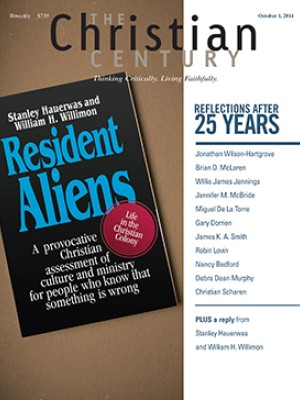German theologian Wolfhart Pannenberg dies at 85

German theologian Wolfhart Pannenberg died September 5 at his home near Munich at the age of 85. He was professor at the University of Munich from 1968 until his retirement in 1993, and he held visiting professorships in the 1960s at the University of Chicago, Harvard, and the Claremont School of Theology.
Pannenberg was widely hailed as a giant on the theological scene. “He had the most encyclopedic mind I have ever encountered,” wrote Philip Clayton, a professor at Claremont, and his theology was “unrivaled in its comprehensiveness, depth, and rigor.”
Read our latest issue or browse back issues.
He studied with Karl Barth but quickly moved in his own direction. While he appreciated Barth’s emphasis on God’s sovereignty and on the decisiveness of God’s revelation in Jesus Christ, Pannenberg was troubled by what he saw as the intellectual dualism in Barth’s work.
In a 1981 essay for the Christian Century series How My Mind Has Changed, Pannenberg wrote: “It seemed to me that the truly sovereign God could not be regarded as absent or superfluous in ordinary human experience and philosophical reflection, but that every single reality should prove incomprehensible (at least in its depth) without recourse to God, if he actually was the Creator of the world. . . . I felt that my philosophy and theology should not be permitted to separate, but that within their unity it should be possible to affirm the awe-inspiring otherness of God even more uncompromisingly than Barth had done.”
Pannenberg viewed theology as a public and scientific venture that drew on the disciplines of philosophy, history, and natural science to explore and discern the truth of Christian revelation. According to the late Stanley Grenz, an American expositor of Pannenberg, he fought a lifelong battle against what he saw as subjectivism in theology. “Dogmatic statements are hypotheses to be tested for coherence with other knowledge,” Grenz said in explaining his mentor’s work.
Pannenberg’s books include Jesus: God and Man (1968), Theology and the Kingdom of God (1969), Theology and the Philosophy of Science (1976), and the three-volume Systematic Theology (1988–1994).
Clayton, writing on a Patheos blog, said that for all Pannenberg’s wrestling with philosophy and science, he was in the end a man of faith. “He believed that the richness and immensity of God call for the most profound study and reflection that our minds are capable of, that theology should meet and exceed the highest standards that philosophers set for themselves, and that we never need to compromise as we wrestle to understand as much of the divine nature as we can grasp through every source available to us.”






